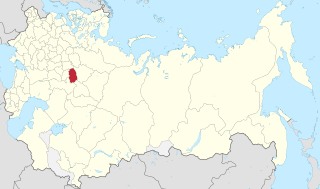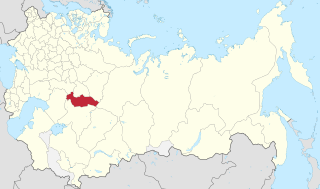
Kazan Governorate was an administrative-territorial unit (Governorate) of the Tsardom of Russia, the Russian Empire, and the Russian SFSR from 1708 to 1920, with its capital in Kazan.

Smolensk Governorate was an administrative-territorial unit (guberniya) of the Tsardom of Russia, the Russian Empire, and the Russian SFSR. It existed, with interruptions, between 1708 and 1929.

Taurida Governorate was an administrative-territorial unit (guberniya) of the Russian Empire. It included the territory of the Crimean Peninsula and the mainland between the lower Dnieper River with the coasts of the Black Sea and Sea of Azov. It formed after the Taurida Oblast was abolished in 1802 during Paul I's administrative reform of the territories of the former Crimean Khanate, which were annexed by Russia from the Ottoman Empire in 1783. The governorate's centre was the city of Simferopol. The name of the province was derived from Taurida, a historical name for Crimea.

Minsk Governorate was an administrative-territorial unit (guberniya) of the Russian Empire, with its capital in Minsk. It was created from the land acquired in the partitions of Poland and existed from 1793 until 1921. Its territory covered the majority of modern-day Belarus.

Kherson Governorate, known until 1803 as Nikolayev Governorate, was an administrative-territorial unit (guberniya) of the Russian Empire, with its capital in Kherson. It encompassed 71,936 square kilometres (27,775 sq mi) in area and had a population of 2,733,612 inhabitants. At the time of the census in 1897, it bordered Podolia Governorate to the northwest, Kiev Governorate to the north, Poltava Governorate to the northeast, Yekaterinoslav Governorate to the east, Taurida Governorate to the southeast, Black Sea to the south, and Bessarabia Governorate to the west. It roughly corresponds to what is now most of Mykolaiv, Kirovohrad and Odesa Oblasts in Ukraine and some parts of Kherson and Dnipropetrovsk Oblasts.

Yekaterinoslav Governorate was an administrative-territorial unit (guberniya) of the Russian Empire, with its capital in Yekaterinoslav. It bordered Poltava Governorate to the north, Don Host Oblast to the east, Sea of Azov to the southeast, Taurida Governorate to the south, and Kherson Governorate to the east, and covered the area of the Luhansk, Donetsk, Dnipropetrovsk, and Zaporizhzhia Oblasts of modern Ukraine.

The Moscow Governorate was a province (guberniya) of the Tsardom of Russia, and the Russian Empire. It was bordered by Tver Governorate to the north, Vladimir Governorate to the northeast, Ryazan Governorate to the southeast, Tula Governorate to the south, Kaluga Governorate to the southwest, and Smolensk Governorate to the west. Moscow Governorate consisted of an area of 33,272.84 square kilometres (12,846.72 sq mi) and a population of 2,430,581 in 1897. Its capital was in Moscow.

Kholm Governorate was an administrative-territorial unit (guberniya) of the Russian Empire, with its capital in Kholm (Chełm).

Poltava Governorate was an administrative-territorial unit (guberniya) of the Russian Empire. It included the territory of left-bank Ukraine and was officially created in 1802 from the disbanded Little Russia Governorate, which was split between Chernigov and Poltava Governorates with its capital in Poltava.

Kiev Governorate was an administrative-territorial unit (guberniya) of the Russian Empire from 1796 to 1919 and the Ukrainian Soviet Socialist Republic from 1919 to 1925. It included the territory of the right-bank Ukraine and was formed after a division of the Kiev Viceroyalty into Kiev and Little Russia Governorates in 1796. Its capital was in Kiev. By the early 20th century, it consisted of 12 uyezds, 12 cities, 111 miasteczkos and 7344 other settlements. After the October Revolution, it became part of the administrative division of the Ukrainian SSR. In 1923 it was divided into several okrugs and on 6 June 1925 it was abolished by the Soviet administrative reforms.

Vologda Governorate, also known as the Government of Vologda, was an administrative-territorial unit (guberniya) of the Russian Empire and the Russian SFSR, which existed from 1796 until 1929. Its administrative center was in the city of Vologda.

Orenburg Governorate was an administrative-territorial unit (Governorate) of the Russian Empire. Its capital in 1797–1802 and 1865–1928 was Orenburg, and Ufa in 1802–1865.

Perm Governorate, also known as the Governorate of Perm, was an administrative-territorial unit (Governorate) of the Russian Empire and the Russian SFSR from 1781 to 1923. It was located on both slopes of the Ural Mountains, and its administrative center was the city of Perm. The region gave its name to the Permian period.

Vyatka Governorate was an administrative-territorial unit (guberniya) of the Russian Empire and the Russian SFSR from 1796 to 1929, with its capital in Vyatka. The area of the governorate roughly corresponds to modern-day Kirov Oblast and Udmurtia.

Chernihiv Governorate was an administrative-territorial unit of the Ukrainian State and the Ukrainian SSR, existing from 1918 to 1925. It was inherited from the Russian system of territorial subdivisions that existed prior to World War I. Specifically, Chernigov Governorate was an administrative-territorial unit (guberniya) of the Russian Empire. It included the territory of the left-bank Ukraine and was officially created in 1802 from Malorossiya Governorate with its capital in Chernigov (Chernihiv). Little Russia Governorate was transformed into the General Government of Little Russia and consisted of Chernigov Governorate, Poltava Governorate, and later Kharkov Governorate.

Vitebsk Governorate was an administrative-territorial unit (guberniya) of the Russian Empire, with the seat of governorship in Vitebsk. It was established in 1802 by splitting Belarusian Governorate and existed until 1924. Today most of the area belongs to Belarus, the northwestern part to Latvia and the northeastern part to Pskov and Smolensk Oblasts of Russia.Together with the Vilna, Kovno, Grodno, Minsk, and Mogilev Governorates, it formed the Northwestern Krai. The provincial city was Vitebsk, the largest city was Dvinsk.

Oryol Governorate was an administrative-territorial unit (guberniya) of the Russian Empire and the Russian SFSR, which existed from 1796 to 1928. Its seat was in the city of Oryol.

Simbirsk Governorate was an administrative-territorial unit (guberniya) of the Russian Empire and the Russian SFSR, which existed from 1796 to 1928. Its administrative center was in the city of Simbirsk, renamed Ulyanovsk in 1924.

Kaluga Governorate was an administrative-territorial unit (guberniya) of the Russian Empire and the Russian SFSR, which existed in 1796–1929. Its capital was Kaluga.

Tula Governorate was an administrative-territorial unit (guberniya) of the Russian Empire and the Russian SFSR, with its capital in Tula.





















